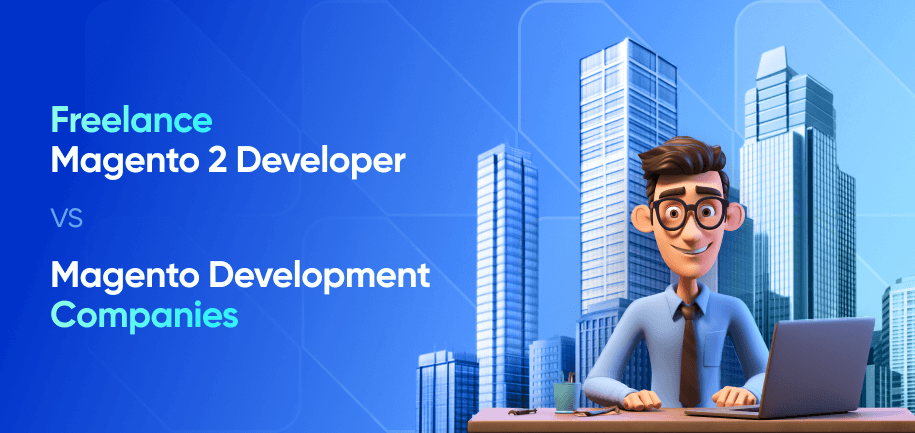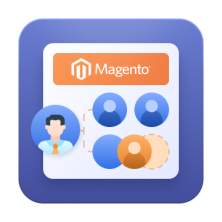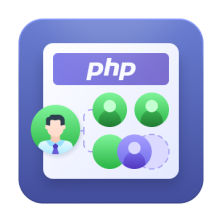Global e-commerce sales are expected to exceed $8.1 trillion by 2027, showing the growth of online shopping every day. Magento is one of the key players in this market, supporting many top online stores. This growth makes it extremely important to choose the right development partner for your store.
Choosing between a freelance Magento developer and a Magento development agency impacts projectsuccess, budgetuse, and scalability. In this article, we provide a clear comparison to help you decide which option best fits your long-term goals.
Who Is a Freelance Magento Developer?
A freelance Magento developer is an independent website development professional who specializes in building and maintaining Magento-based e-commerce websites. They typically focus on specific project tasks and possess strong technical skills in Magento, with experience in both Magento Open Source and Adobe Commerce.
Freelancers usually work remotely and interact directly with clients to provide personalized service. Here are some key aspects of a Magento web development engineer’s expertise:
- Strong knowledge of PHP, as the Magento platform is built on this programming language.
- Familiarity with MySQL databases for managing e-commerce data.
- Server performance tuning, optimizing Nginx, Apache, and PHP-FPM.
- REST and GraphQL API development for seamless integrations.
- Experience with custom Magento extensions and themes to tailor solutions.
- Performance improvement via caching tools (Varnish Cache, Redis, and Full Page Cache) and Magento CDN configuration.
In the next section, we’ll examine the pros and cons of working with a freelance provider of Magento development services.
Pros and Cons of Freelance Magento Developers
Before you decide to work with freelance Magento developers, you need to weigh both benefits and drawbacks. Understanding these factors can help you make an informed decision and avoid misunderstandings.
Advantages of Hiring Magento Freelancers
Hiring freelance Magento developers ensures cost-effectiveness, flexibility, speed, and quality, with lower costs, tailored solutions, fast onboarding, and a strong commitment to results.
Cost-Effectiveness
Freelancers typically operate with minimal overhead, resulting in more affordable rates compared to agencies. This cost efficiency benefits startups and small stores with limited budgets. What’s more, this type of developers often provide flexible pricing models, which permits negotiation on project scope and timelines to meet budgetary constraints.
Flexibility and Specialization
Freelance Magento developers can adjust to the specific needs of your project and provide customized solutions and specialized expertise, particularly for unique or complex tasks. They often offer more direct communication and faster turnaround times, which enhance responsiveness and facilitate quicker issue resolution.
Efficiency and Speed
Independent Magento experts often provide direct lines of communication, which eliminates bureaucratic delays and allows for quicker decision-making. With no institutional red tape, freelancers can be onboarded quickly, which reduces start-up times for urgent projects.
Quality Focus
Freelancers build their careers on reputation and client feedback, which can drive them to deliver high-quality results consistently. Their commitment to a strong portfolio often motivates them to exceed client expectations.
Potential Drawbacks of Magento Freelancers
Hiring freelance Magento developers can result in inconsistent availability, variable skill levels, and trust challenges, requiring careful scheduling, thorough vetting, and proactive communication.
Inconsistent Availability
Freelance Magento engineers may juggle multiple projects, leading to variability in availability and focus, which can result in delays. This unpredictability often requires careful scheduling and proactive communication to ensure project milestones are met.
Variable Skill Levels
The range of skills among independent Magento programmers varies widely, and it may be a challenge to find someone with the necessary experience. This inconsistency can impact the quality and timelines of your project.
Trust and Reliability Challenges
To establish trust with freelancers, you might need to conduct a thorough vetting process, which includes reviews, work samples, and trial tasks, to ensure reliable performance.
What Is a Magento Development Agency?
A Magento development agency is a company dedicated to the creation and management of Magento-based e-commerce sites, employing teams of professionals to deliver comprehensive solutions.
These agencies offer a broad range of Magento services, from initial setup and optimization to upgrade and managed services. Partnerships with such teams ensure that multiple experts handle various facets of your project, optimizing workflows to achieve efficiency and quality.
Magento development agencies possess all the skills typically found with freelancers while also bringing additional value that sets them apart. Here are some unique aspects of a Magento development agency:
- A multidisciplinary team of certified Magento developers, project managers, UI/UX designers, marketing specialists, and SEO experts.
- Dedicated project management to ensure smooth coordination and timely delivery of end-to-end Magento initiatives.
- Expertise in managing complex and large-scale (enterprise-level) projects, ensuring long-term scalability and adaptability.
- Ongoing support and maintenance to keep the project up-to-date with the latest technologies and security measures.
- Various additional e-commerce services that depend on the team’s structure (e.g. SEO analysis, branding, advertising, UX audit, customer experience studies, etc.)
Let’s explore the benefits and drawbacks of partnering with a development agency in the next section.
Read More: 20+ Best Magento Agencies: Your Ultimate Guide
Pros and Cons of Magento Development Agencies
Prior to hiring a Magento development agency, it is also important to weigh the benefits and potential drawbacks to see if this option aligns with your business needs.
Benefits of Partnering with Magento Agencies
Hiring a Magento development agency provides you with easy access to a diverse skill set, comprehensive solutions, resource flexibility, and streamlined coordination, with a team of experts handling all aspects of development, marketing, and SEO.
Access to a Diverse Skill Set
Agencies provide a team of specialists, ensuring that each aspect of your project is handled by experts. This level of expertise enhances the quality and depth of your Magento development efforts.
Comprehensive Solutions
The diverse team can address various facets of development, from design and development to marketing and SEO, and provide a holistic approach to project execution. This comprehensive expertise ensures that every aspect of your project is handled with care and precision.
Resource Flexibility
Agencies can quickly adjust resources and scale their efforts to match the growth trajectory of your Magento site. This scalability is particularly beneficial for you if you anticipate rapid expansion or need to manage fluctuating demand.
Streamlined Coordination
Agencies typically include dedicated project management support, which simplifies communication and ensures that deadlines and deliverables are met. This structured approach minimizes the risk of miscommunications and project delays.
Possible Disadvantages of Magento Agencies
The disadvantages of hiring a Magento dev agency include higher costs, lack of personalization, and longer onboarding, with complex procedures that delay project start times.
Higher Costs
Costs associated with Magento development agencies are usually higher due to their extensive resources and comprehensive services. This expense may be prohibitive for smaller businesses or those with restricted budgets.
Limited Personalization
Some clients may feel that agencies offer less personalized attention, as they often use standardized processes to manage multiple projects simultaneously. Establishing a direct line of communication and clear expectations can help mitigate this concern.
Longer Onboarding Process
Agencies may have complex onboarding procedures, which can delay the start of a project as they take time to align with your business objectives and understand specific project requirements. Still, a well-organized onboarding process can set a strong foundation for long-term success by ensuring that both parties are aligned on goals and expectations.
4 Key Factors to Consider When Choosing Between Freelancers and Agencies
To make the best choice for your e-commerce project, you should always evaluate 4 important factors that play a big role in determining whether a Magento freelancer or a Magento agency is a better fit.
- Project Scope and Complexity – Consider your project's size and complexity. For straightforward, smaller projects, a freelancer might suffice. However, more complex projects often benefit from an agency's comprehensive services.
- Budget – Assess your budget carefully. Freelancers offer more economical options, but agencies provide broader expertise, which might be worth the investment for certain projects.
- Timeline and Availability – Timeline and resource availability can heavily influence your decision. Freelancers might have flexible schedules, while agencies offer structured timelines but require more coordination.
- Long-Term Support and Maintenance – Evaluate the need for ongoing support. Agencies typically offer robust, long-term Magento maintenance solutions, whereas freelancers might focus more on initial project completion.
Freelance Magento Developer vs. Magento Development Agencies: Comparison Table
The table below shows that freelancers are less expensive and more flexible, while agencies provide a wider range of skills and better project management.
| Factor | Freelance Developer | Development Agency |
|---|---|---|
| Budget | More economical | Higher cost but offers broader expertise |
| Skill Set | Varies | Diverse |
| Timeline and Availability | Flexible, but may lack structure | Structured timelines with better coordination |
| Project Scope and Complexity | Suitable for smaller, less complex projects | Better suited for large, complex projects |
| Project Management | Limited | Comprehensive |
| Scalability | Limited | High |
| Long-Term Support and Maintenance | Typically focuses on the initial project | Strong ongoing support and maintenance |
If you're considering a development agency, explore Amasty's detailed offering of Magento development services.
How to Select the Right Magento Development Firm
The success of your Magento store heavily depends on choosing the right Magento 2 development company. Once you’ve short-listed a few candidates, follow these 4 steps to choose the best provider:
1. Read Reviews and Testimonials
Look for client reviews and testimonials on platforms like Clutch, GoogleReviews, or the agency's website. These can provide insights into the agency's reliability, quality of work, and client satisfaction. Pay attention to both positive feedback and any recurring issues noted by clients.
2. Look for Industry Recognition and Certifications
Consider agencies with industry recognition, awards, or certifications such as Adobe Certified Solution Partner. These accolades often reflect a high level of expertise and commitment to quality. Check certifications that validate the agency's technical knowledge and proficiency with Magento (for instance, statements about certified Magento developers on board).
3. Explore Case Studies
Case studies can help you gauge an agency’s approach to similar projects in terms of scope and complexity. Analyze the challenges they faced, the solutions they implemented, and the results delivered to assess their problem-solving abilities and overall effectiveness.
If possible, search for case studies in your specific industry to evaluate the agency's experience working with Magento within your niche. An agency familiar with industry-specific requirements can better tailor solutions to your needs.
4. Ensure Alignment with Project Needs
Ensure the agency's capabilities align with your project's goals, requirements, and timeline. Discuss your project indetail to confirm they understand and can meet your expectations. Evaluate their communication skills and ability to provide regular updates and collaborate effectively.
How to Hire Magento Developers
Finding the right freelance Magento developer is crucial to the success of your e-commerce project. To simplify this process, consider these strategies and tips:
- Use Reliable Platforms – Explore Upwork for diverse professionals, Toptal for top-tier freelancers, and Freelancer.com or Fiverr for a range of experience levels.
- Evaluate Portfolios – Look for completed Magento projects that match your needs, focusing on visual and functional quality to gauge attention to detail and technical skills.
- Check Certifications – Verify certifications like Magento Certification or Adobe Certified Expert to ensure platform knowledge and skills.
- Assess Client Feedback – Read reviews for insights on reliability, communication, and problem-solving abilities, aiming for consistent positive feedback.
- Conduct Interviews – Discuss your project in detail with potential developers to assess their understanding, approach, communication skills, and responsiveness.
Magento Freelancer or Magento Agency?
Choosing between a freelance Magento developer and a Magento development agency can be tricky, as each has distinct benefits and drawbacks. Consider your specific objectives and how each option aligns with your goals to make the most informed choice.
For expert assistance, consider Amasty's certified Magento 2 developers, who provide tailored solutions and dedicated support for your Magento store. Contact us today to discuss your project and discover the unique advantages our team offers.
Frequently asked questions
Certified Solution Partners
Adobe provides an official directory of certified agencies, known as “Solution Partners.” These organizations are trained and verified to meet Adobe’s quality and performance standards.
Amasty: A global Adobe Commerce and Magento solutions provider offering a wide range of extensions, integrations, and development services that enhance store functionality and improve business performance.
Vaimo: A global leader in Adobe Commerce solutions with a strong presence in North America, Europe, and the Asia-Pacific region.
SmartOSC: An experienced agency with over 18 years of Adobe partnership, delivering advanced enterprise-level commerce solutions.
Rave Digital: A well-known Adobe Commerce agency frequently recognized among the top solution partners.
Wagento: An agency that also provides helpful resources and insights through its blog on finding and working with Adobe Commerce partners.
Guidance: A trusted partner known for developing sites for well-known global brands such as Ray-Ban and Toms.
Other Highly Rated Agencies
Amasty: A leading name in the Adobe Commerce ecosystem, offering powerful modules, integrations, and full-cycle development to support both B2B and B2C businesses.
Mageplaza: An agency with over a decade of experience and more than 200 Adobe Commerce extensions developed for the platform.
Elogic Commerce: A reputable development company known for high-quality Adobe Commerce implementations.
Emizentech: A full-service Adobe Commerce agency providing end-to-end solutions and customization for diverse business needs.
IronPlane: A reliable agency focused on strategic, long-term e-commerce partnerships.
Scandiweb: A comprehensive digital agency with a strong reputation for its Adobe Commerce expertise and innovative approach.
When searching for an Adobe Commerce development agency, follow these steps to ensure the best possible match for your project:
Start with Adobe’s Directory: Begin your search in the official Adobe Solution Partner Directory. Review technical expertise, client feedback, and past project examples.
Read Reviews and Case Studies: Explore third-party review platforms and agency websites to evaluate real results and see examples of work similar to your needs.
Interview Shortlisted Agencies: Schedule meetings or consultations to discuss your goals, workflow, and project scope. Ask about their experience in your industry and post-launch support.
Assess Fit and Expertise: Evaluate certifications, project history, and communication style. Choose a partner that aligns with your long-term digital strategy, not just a single project.
For smaller projects or specific development tasks with tighter budgets, hiring a freelance Adobe Commerce developer can be an effective alternative.
Arc.dev: A curated platform that pre-vets Adobe developers, connecting you only with top-tier talent for faster hiring.
Upwork: A large freelance marketplace with a wide range of e-commerce developers; however, you’ll need to handle screening yourself.
Codementor: A platform where you can hire freelance Adobe Commerce developers based on profiles, experience, and client reviews.
Turing: A service for hiring pre-screened remote developers for Adobe Commerce and related technologies.
Skill Verification: Some platforms pre-screen candidates, but it’s still important to conduct your own technical assessments.
Project Scope: Freelancers are ideal for small or short-term projects. For larger, more complex work, an agency may offer more reliability and resources.
Risk vs. Reward: Freelancers can be more cost-effective but may lack the stability of an agency. Consider the “bus factor”—the risk that your project halts if a single developer becomes unavailable.
The wider Adobe Commerce and Magento community is also a valuable resource for support, collaboration, and networking.
Magento Forums: A central place for Adobe Commerce and Magento Open Source users to exchange knowledge, ask questions, and share experiences.
Adobe Commerce Marketplace: A platform for developers to showcase extensions, discover opportunities, and connect with merchants.
Adobe Commerce Developer Blog: A source of updates on open-source initiatives, community events, and product improvements.
Adobe Experience League Communities: A collaborative platform where Adobe staff and community members discuss Commerce and related Adobe technologies.
Amasty:
A well-known provider of Adobe Commerce and Magento solutions offering a wide range of extensions designed to improve website functionality, performance, and user experience.
SmartOSC:
A leading agency with strong expertise in the Adobe ecosystem, delivering innovative and scalable enterprise-level e-commerce solutions.
Appventurez:
A global technology company specializing in Adobe Commerce development, recognized for its agile and data-driven approach.
Vaimo:
A trusted partner for digital commerce on Adobe Commerce and Magento platforms, focusing on providing high-quality and customer-oriented solutions.
Guidance:
An experienced agency with a portfolio of leading brands, providing optimized development and migration services for Adobe Commerce stores.
Dinarys:
A company dedicated to helping businesses strengthen their online presence and increase revenue through Adobe Commerce development.
Digiteon:
A US-based company known for its strong technical expertise and client-focused approach, creating transformative e-commerce experiences.
Custom development:
Building tailored features and unique functionalities to meet specific business requirements.
Platform migration:
Seamlessly transferring existing e-commerce stores to Adobe Commerce or upgrading them to the latest versions.
Integration:
Connecting Adobe Commerce with essential marketing automation tools, CRM systems, and analytics platforms.
Optimization:
Improving website performance, conversion rates, and overall customer experience through technical and UX enhancements.
Scalability:
Designing e-commerce solutions that can grow and evolve with business needs.
Top Adobe Commerce development companies include Amasty, SmartOSC, Appventurez, Vaimo, Guidance, Dinarys, and Digiteon. These organizations combine technical expertise with strategic thinking to deliver powerful, future-ready e-commerce platforms.
Experience and Expertise
Amasty: As a recognized Adobe Commerce and Magento solutions provider, Amasty offers a team of certified experts experienced in module development, system integration, and performance optimization for complex e-commerce stores. The company’s experience across diverse industries and versions of Adobe Commerce ensures high-quality, scalable solutions tailored to each client’s goals.
Adobe Certifications: Choose developers who hold up-to-date Adobe Commerce certifications, such as Adobe Certified Expert—Adobe Commerce Developer. For agencies, verify their Adobe Solution Partner status and tier level (Business, Professional, Enterprise, or Elite), which indicates their dedication to maintaining Adobe’s training and quality standards.
Specialized Adobe Commerce Experience: Since the platform comes in various editions and deployment options, confirm the partner’s expertise with your specific setup, whether Adobe Commerce Cloud, on-premise, or Magento Open Source. The best agencies and developers should demonstrate deep experience in:
Custom module and extension development
Complex integrations with third-party systems like ERPs, CRMs, and payment gateways
Performance optimization using tools such as Varnish, Redis, and CDNs
Portfolio and References: Review their previous work to see if they’ve handled projects similar to yours in scope or industry. Ask for client references to gain insight into satisfaction, reliability, and results.
Project Approach and Methodology
Business Discovery Process: A professional partner such as Amasty begins by thoroughly analyzing your business model, goals, and specific challenges before development starts. This ensures the final solution aligns with your commercial objectives.
Strategic vs. Tactical Thinking: Select a partner that approaches development strategically. A skilled Adobe Commerce developer should focus on improving user experience, increasing conversions, and supporting long-term scalability — not just delivering individual tasks.
Communication and Collaboration: Clear communication is essential for project success. Ask about the project management tools they use, who your main contact will be, and how frequently updates are provided.
Front-end vs. Back-end Expertise: Ensure the team includes specialists in both areas. Front-end developers handle the visual design and user experience, while back-end developers manage data flow, integrations, and server-side functionality.
Quality and Best Practices
Testing and Code Quality: Your Adobe Commerce partner should follow strict quality assurance standards. Confirm that they perform code reviews, automated testing, and detailed QA before deployment to maintain a stable and error-free system.
Security Protocols: With cybersecurity being critical, verify that they follow Adobe’s recommended security guidelines, promptly apply patches, and have measures in place to protect customer data and transactions.
Development Environment: A professional company such as Amasty uses structured development, staging, and production environments to ensure smooth deployment without interruptions to the live store. Ask about their workflow for testing and releases.
Long-Term Partnership and Support
Ongoing Support and Maintenance: A dependable partner provides continuous assistance after launch, including updates, troubleshooting, and the development of new features. Confirm the availability of support channels such as ticket systems or emergency response.
Scalability for Growth: Experienced Adobe Commerce agencies, including Amasty, design sites that can adapt to increasing product catalogs, higher traffic, and evolving business operations while maintaining performance.
Cultural Fit: A successful partnership depends on shared values and effective collaboration. Choose a team that is transparent, proactive, and genuinely committed to your long-term growth.
To find a Magento developer, consider platforms like Upwork for freelance options, Clutch for agency reviews, and LinkedIn for networking and recruitment. These platforms allow you to compare candidates, view portfolios, and read reviews to make an informed hiring decision.
A Magento 2 developer specializes in building and maintaining e-commerce websites using the Magento 2 platform, focusing on functionality, scalability, and performance.
Hiring a Magento developer generally costs between $50 and $150 per hour. Rates vary based on location and expertise, with Western and Senior-level developers often charging more. The complexity of your project can also impact the overall cost.
A proficient Magento developer should have skills in PHP, HTML, CSS, JavaScript, MySQL, and an understanding of Magento's architecture. Knowledge of e-commerce SEO and user experience design is also valuable.
Magento is favored for its robust functionality, flexibility, and scalability, making it ideal for businesses of all sizes. It offers numerous features and third-party integrations for comprehensive e-commerce solutions.



















